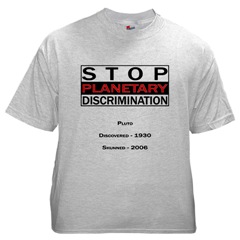 When the International Astronomical Union shook up the solar system by stripping Pluto of its planet status, it did more than ban the celestial body from the cosmic planet club.
When the International Astronomical Union shook up the solar system by stripping Pluto of its planet status, it did more than ban the celestial body from the cosmic planet club.Discovered in 1930 by 24-year-old American astronomer at Lowell Observatory in Arizona, Clyde Tombaugh, Pluto’s planet reign lasted 76 years.
Pluto’s naming is an interesting story on its own.
11-year-old Venetia Burney, from Oxford, England, suggested the name.
It was chosen from a long list that included Atlas, Apollo, Zeus, Minerva and even Bacchus. As Jeff Mullin pointed out, it’s not surprising that New York Times reporters supported Bacchus, the Roman god of wine and intoxication.
The shakeup launched a merchandise wave that would do credit to any presidential campaign.
Scores of Web-savvy entrepreneurs went on the Internet, selling Pluto memorabilia fromT-shirts and mugs to bumper stickers and mouse pads.
Apart from objecting to poor Pluto’s demotion from a proper planet to a wannebee or dwarf one, they obviously wanted to cash in.
Within 24 hours of the “bad” news, a wave of Pluto items appeared on Cafepress.com (a San Francisco-area Internet company that prints T-shirts and other merchandise), including 200 designs on more than 1,500 products.
Many items and slogans related to Pluto's demotion and advocated its return with T-shirts proclaiming "Save Pluto" and "Stop Planetary Discrimination."
Why is there such uproar about the reclassification of the solar system?
The public just doesn’t buy it.
It’s similar to a company suddenly rebranding or redefining its product, without customer input.
And if there is no market acceptance, it’s doomed to fail.
The product “planet” had suddenly been redefined as:
"a celestial body that is in orbit around the sun, has sufficient mass for its self-gravity to overcome rigid body forces so that it assumes a nearly round shape, and has cleared the neighborhood around its orbit".
(As The Chaser pointed out, this definition also applies to globetrotting Luciano Pavarotti)
People all over the world were happy with the known solar system, and were not waiting for a reshuffle.
They just don’t see the advantage of coming up with this new planet definition.
To quote Dr. Hiroshi Kyosuke of the University of Tokyo:
"It seems counterintuitive to me that we should say Pluto is no longer a planet, yet Donald Rumsfeld is still Secretary of Defense. After all, Pluto has done no harm."
Pluto the dog, who made his debut in 1930, couldn’t agree more.
According to Disney insiders, he worries about the fate of this namesake and all the textbooks that must be rewritten.
Our Pluto might not be reinstated as our ninth planet, but the 1930 discovery for sure made marketing history.


